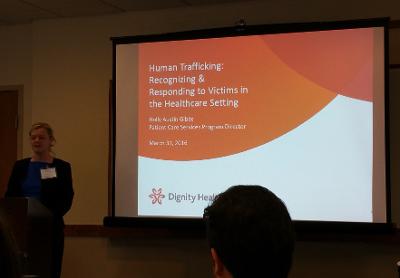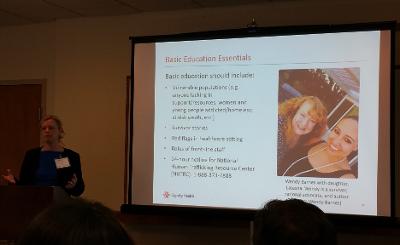LCC, Inc. was invited by Dignity Health Foundation to participate in a Human Trafficking Workshop for Health Care Providers.
Even though as interpreters, we are not in a role of providing health care, it is still essential that we learn more about the issue of human trafficking. With more knowledge, we can better identify, support providers, and refer victims to proper services in the community.

What is Human Trafficking?
When someone is recruiting/transporting a person(s) by means of threat, force, coercion, abduction, deception, abuse of power, position of vulnerability to achieving having control over another person for sexual or labor exploitation. Modern day slavery, the victim is unable to leave the situation.
According to federal legislation, a person is a victim of human trafficking when:
- Anyone under 18 induced to perform a commercial sex act under any circumstance.
- Anyone over 18 induced to perform a commercial sex act due to use of force, fraud, or coercion.
- Anyone induced to perform labor/services due to the use of force, fraud, or coercion.
Every country is affected by human trafficking and even U.S. citizens and residents are at risk of victimization within the United States.
Human trafficking is NOT human smuggling. Human smuggling is a violation of immigration laws, where human trafficking is a violation of human rights.
Anyone can be a sex trafficker and victims may not know their rights and may not self-report for various reasons.
To care for these victims, a victim-centered approach must be taken and focus on their needs and concerns and prioritize their wishes, safety, and well-being. Seek their input in all decisions. Be compassionate and nonjudgmental.

Red Flags include:
- Unpaid, paid little, or only through tips
- Working excessively long/unusual hours, not allowed breaks
- Suffers unusual restrictions
- Sleeping in the same place that they work
- Owes a large debt, unable to pay it off
- Recruited through false promises
- Has high security measures in work/living locations
- Exchanging sex for survival needs (ex. money, food, shelter)
- Working in sex industry, has pimp/manager
- Seems to have lost sense of time
- Unusually fearful/anxious behavior after mentioning law enforcement
- Avoids eye contact
- Appears malnourished, shows signs of neglect, physical or sexual abuse
- Lacks control over their decisions, movements, identification, money
- Has few personal possessions
- Not allowed to speak for themselves
- Communication seems rehearsed
- Has numerous inconsistencies in their story
If you notice something, even if you are unsure, call:
The National Human Trafficking Hotline at 1 (888) 373-7888
(non-governmental and confidential)
In an emergency, call 911.
You are not expected to 'save' victims, but provide an opportunity for them to help themselves. Do not force the victims to report if they do not wish to.
Dignity Health Foundation - Human Trafficking: Recognizing & Responding to Victims in the Healthcare Setting - Holly Austin Gibbs March 31, 2016.
The National Human Trafficking Hotline - 888-373-7888 and visit the website at www.NoTraffickAhead.org
Translate This Page